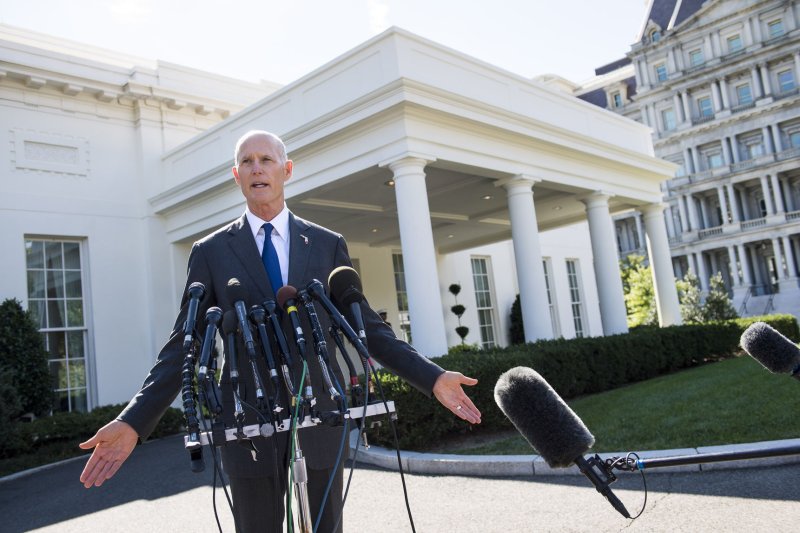A decision to pull Florida from offshore drilling plans was seen as a political favor by the Trump administration to Florida Gov. Rick Scott, who is said to have Senate ambitions. Photo by Kevin Dietsch/UPI |
License Photo
Jan. 10 (UPI) -- Florida Gov. Rick Scott said getting Florida off of President Donald Trump's oil and gas plan was a hard fought battle, though some critics said it smacked of political favor.
U.S. Interior Secretary Ryan Zinke emerged from a meeting with Florida Gov. Rick Scott in Tallahassee with an announcement that an offshore lease plan that's barely a week old has been modified to remove the Florida coastline from consideration.
In a statement after the meeting, Zinke said the decision was made in response to the governor's leadership.
"I support the governor's position that Florida is unique and its coast is heavily reliant on tourism as an economic driver," he said.
Scott is facing a term limit and widely expected to launch a challenge to take the seat of long-time Sen. Bill Nelson, a Democrat and staunch opponent of drilling for oil and gas off the Florida coast.
In a statement to UPI, Nelson said he's spent his entire political career opposing drilling offshore Florida and now Zinke, who had a mixed environmental record while representing Montana as a Republican, changes tact just a few short days after putting the coastal state on the map for the oil and gas industry.
"This is a political stunt orchestrated by the Trump administration to help Rick Scott, who has wanted to drill off Florida's coast his entire career," he said. "We shouldn't be playing politics with the future of Florida."
Before the announcement from Zinke and Scott, Nelson on Wednesday led a group of 37 Democrats in the Senate in telling the interior secretary they were "deeply troubled" by the administration's offshore plans.
Zinke said Thursday that nearly all of the outer continental shelf would be open to drillers in the next five-year lease starting in 2019. Under the current lease plan, released by former President Barack Obama, the Trump administration, a vocal supporter of the fossil fuels industry, said about 90 percent of the total acreage offshore was put off limits.
The proposed program, opened for public comment, called for 19 lease sales offshore Alaska, seven in the Pacific Region, 12 in the Gulf of Mexico and nine in the Atlantic.
Industry figures show that oil and natural gas could account for about 75 percent of the global demand expected over the next 20 years. With the United States emerging as a dominant global exporter of oil and gas, supporters of Trump's plan said tapping more offshore resources made sense.
Even without the plan, federal estimates this week said total U.S. oil production could rival that of Saudi Arabia.
Vicky Wyatt, a campaign director for Greenpeace, said governors from other coastal states aren't as fortunate as Scott.
"Clearly, Trump and Zinke's 'energy dominance' just means political convenience," she said. "It's time to stop this destructive charade and begin the clean energy future in earnest, now."
After Zinke released the draft plan last week, California Gov. Jerry Brown, Oregon Gov. Kate Brown and Washington Gov. Jay Inslee issued a joint statement that described the decision as a "reckless, short-sighted action."
Alaska Gov. Bill Walker, however, said the proposal allows the state to safely develop its natural resources as "we see fit."















